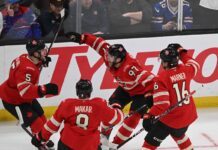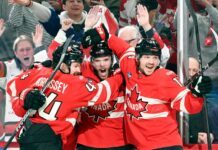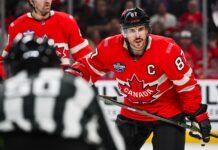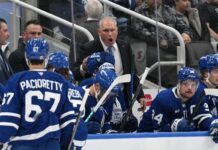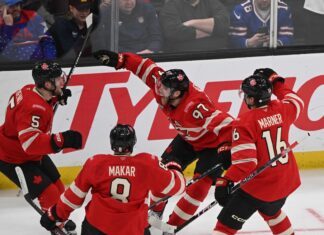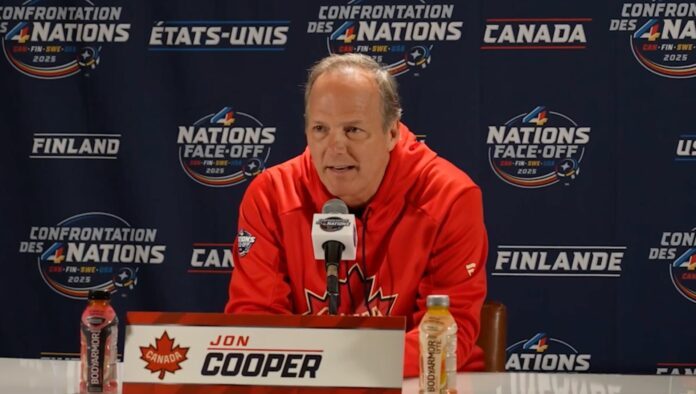
After Team Canada’s practice on Wednesday, head coach Jon Cooper discussed preparation for the final against Team USA, adjustments from last Saturday’s loss, and Connor McDavid and Sidney Crosby’s leadership.
Your team went through some adversity, losing a Stanley Cup Final, before you understood how to win one. We have seen that with Sidney Crosby and others. What does it mean for a player like Connor McDavid to get so close last season, fall short in a Game 7, and now have another stage similar to a Game 7?
Cooper: It is really hard to win. It’s really, really hard. Before we won our first Stanley Cup, it wasn’t just losing in 2015. It was Game 7 in the Conference Finals of 2016, Game 7 of the Conference Finals in 2018, and then the sweep in 2019. There was a lot building to that.
You just never know when you are going to get your shot again. Fortunately, we were able to win. Other people have probably come into the league and won right away — I am sure they have — but that is rare. I always say, “Any time you are in a position to win, don’t apologize for winning. You win as much as you can, as many times as you can.”
To me, Connor losing a Game 7 is hard to digest when you get there. Many times, you think, “Oh, I’ll just be right back. We’ll get right back.” It just doesn’t work that way. You have to embrace these moments like they are going to be the last.
I know for sure that he is doing that.
Brad Marchand is kind of a role player on this team, but when you have someone with a Maple Leaf-shaped heart playing in his home building, what do you expect from him in a game like the final on Thursday?
Cooper: You are using the word “role,” and everyone’s role is different, but it doesn’t make them insignificant just because you play fewer minutes than some of the other guys. I can’t say enough about what he has done — not only on the ice but off the ice — to galvanize this group, especially being in his home city for a few days with how he has brought the team together and looked after everyone. That goes miles and speaks to the character this kid is all about.
When you say role player, I would consider everyone on the ice tomorrow a role player. They are just all different, but they are all extremely significant to us.
With so much going on in the world, apart from the hockey, what do you think the team means tomorrow for Canadians?
Cooper: I am a hockey coach. Am I aware of what is going on around the world? I am. When you are in the position we are in to make a country proud — to make a country be able to stick its chest out a little bit further — it is rewarding. We understand that.
I am not going to speak for the U.S. team, but before that puck drops, I don’t think anyone will be thinking about anything outside of the hockey game and winning the game. Do we all know what it means? We do, but that hasn’t entered into our locker room.
These guys are all in it for each other, knowing that there is an outcome we want and a process we have to go through to get that outcome. When it is all said and done, if we pull this off, we will know what it has meant for everybody at home. We are very cognizant of that.
After the loss to the U.S. on Saturday, you mentioned the last 20 feet on the ice weren’t good enough. Since then, have you identified what the U.S. did inside those 20 feet to prevent you from being effective there, and what you need to do more of to have more success?
Cooper: We have. I thought we took a big step forward in the Finland game. If I was going to break it down, I would say in the Sweden game, we played 30 minutes. In the U.S. game, we played 40. In the Finland game, we played 50. Tomorrow night, we have to play 60. If we do that, we will be okay.
Probably not a lot has to be said before a game like this, but can you take us behind the scenes as a coach in terms of when you will start cooking up your message and what you will share with the team? How do you manage your own emotions before a game like this one?
Cooper: I have been cooking up this message for months. I am finally going to get to deliver it.
Some of it comes from what has happened. When you are thinking back to a year ago, six months ago, a month ago, to right now, it has completely changed, especially with what has gone on in the tournament.
Everybody in this room follows this sport for a living, and it has been really cool to see the whole world following the sport. Everybody should be proud, the U.S. team included, of how their passion, want, and will to win and compete on such an organic level has galvanized not only the political world and sports worlds but everybody.
I am really proud to be a part of that, especially with our group and what we have done. I am not sure much has to be said by me. We have built this moment. We wanted to be in this moment. Now we are here, and they know what they have to do to finish it off.
Defending 6-on-5 has been a part of the game forever, but when did it get so important that you had to start practicing it?
Cooper: You know what happens in these tournaments? You just don’t have time to practice. I am a big believer that video can only do so much until you are actually in the trenches on the ice. Visualizing it is one thing, but actually being there to do it is another.
You practice that because, if we are in that situation tomorrow night, it will be a good thing.
Crosby and McDavid spent a lot of time talking to the coaching staff after practice. How have you noticed those two elevating each other as leaders?
Cooper: You’ve heard that term, “Check your ego at the door.” The best leaders know how to do that. That is probably the thing that I have been most impressed with in the short time with this group. Every ego got checked at the door. You marvel at that.
There are players who have talent and get the limelight. The cameras are on them a little more than others, and they get the ice time. I have seen the guys who have walked into the room and shown that, but nobody in this group has.
To me, that is leadership. The other guys see it. It just galvanizes the team. That is what they have done.
What has surprised you about this event, if anything?
Cooper: It goes to show you how passionate hockey players are to A) play the game and B) play for their country. I am not just including the two teams in the final. Sweden and Finland were outstanding. You could see it on the ice.
When you look at Finland in a 4-1 game late, they had every reason to lay down and say, “Let’s finish the last few days and get some vacation.” They did anything but that. To me, that is a big sign of respect. This is what it means to them.
Anybody who thought they were going to come in here and see an All-Star Game was sorely mistaken. This has been anything but. It has been All-Stars, but it has not been an All-Star Game.
Brad Marchand called Team USA the best team he has ever played against. Where do they rank in terms of teams you have coached against?
Cooper: The best team I was a part of was the very first practice with Team North America. That is when I stepped on the ice and couldn’t believe the pace, the speed, and what was going on with these young kids. That was eye-opening to me.
I have been fortunate to be part of some major events in this great game, but the US-Canada game was the fastest, most intense game and collection of talent that I have ever been a part of.
Ironically, it is all of those kids who were on that U23 team, eight years later. They’ve gone from kids to men. Boy, are they good hockey players.





